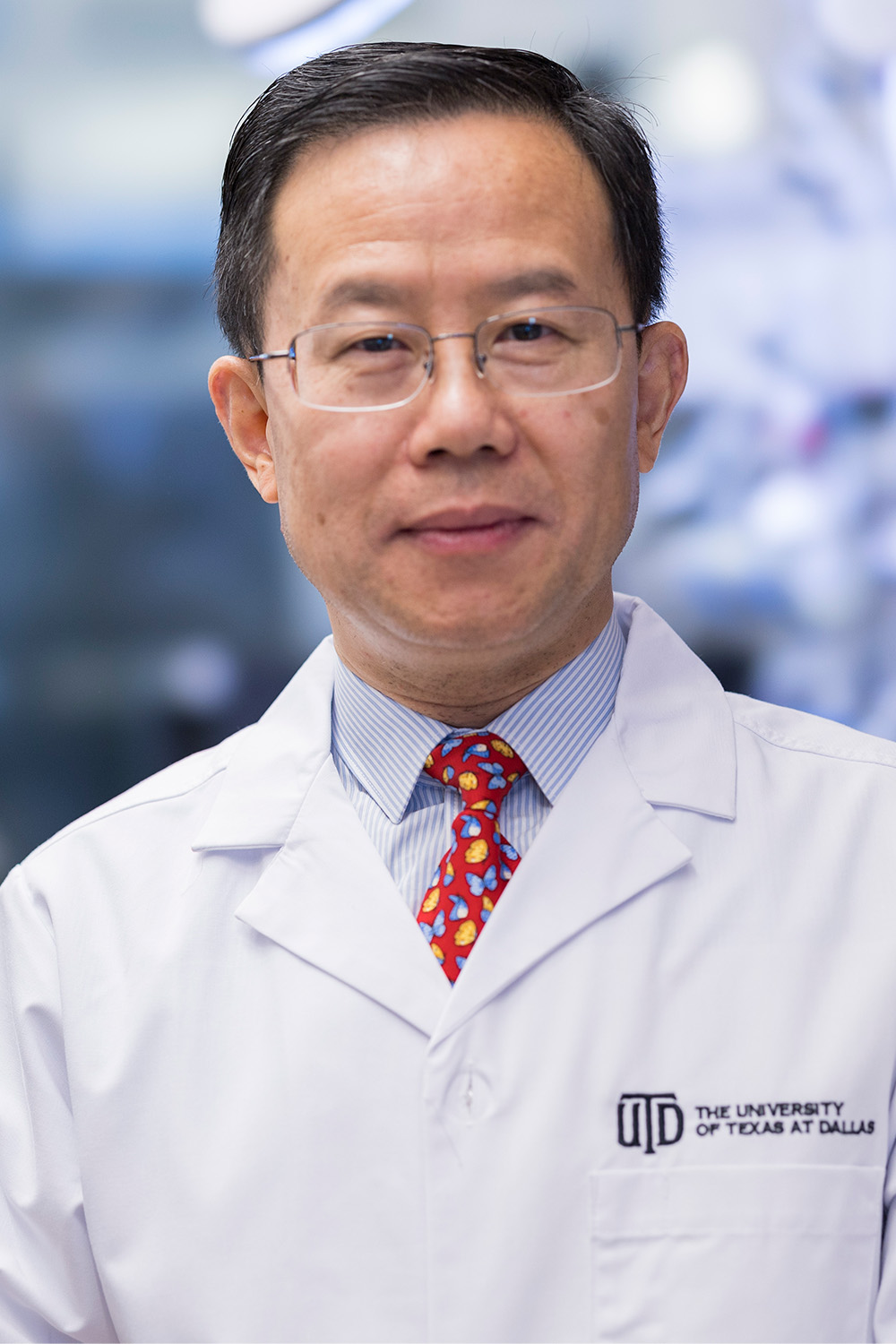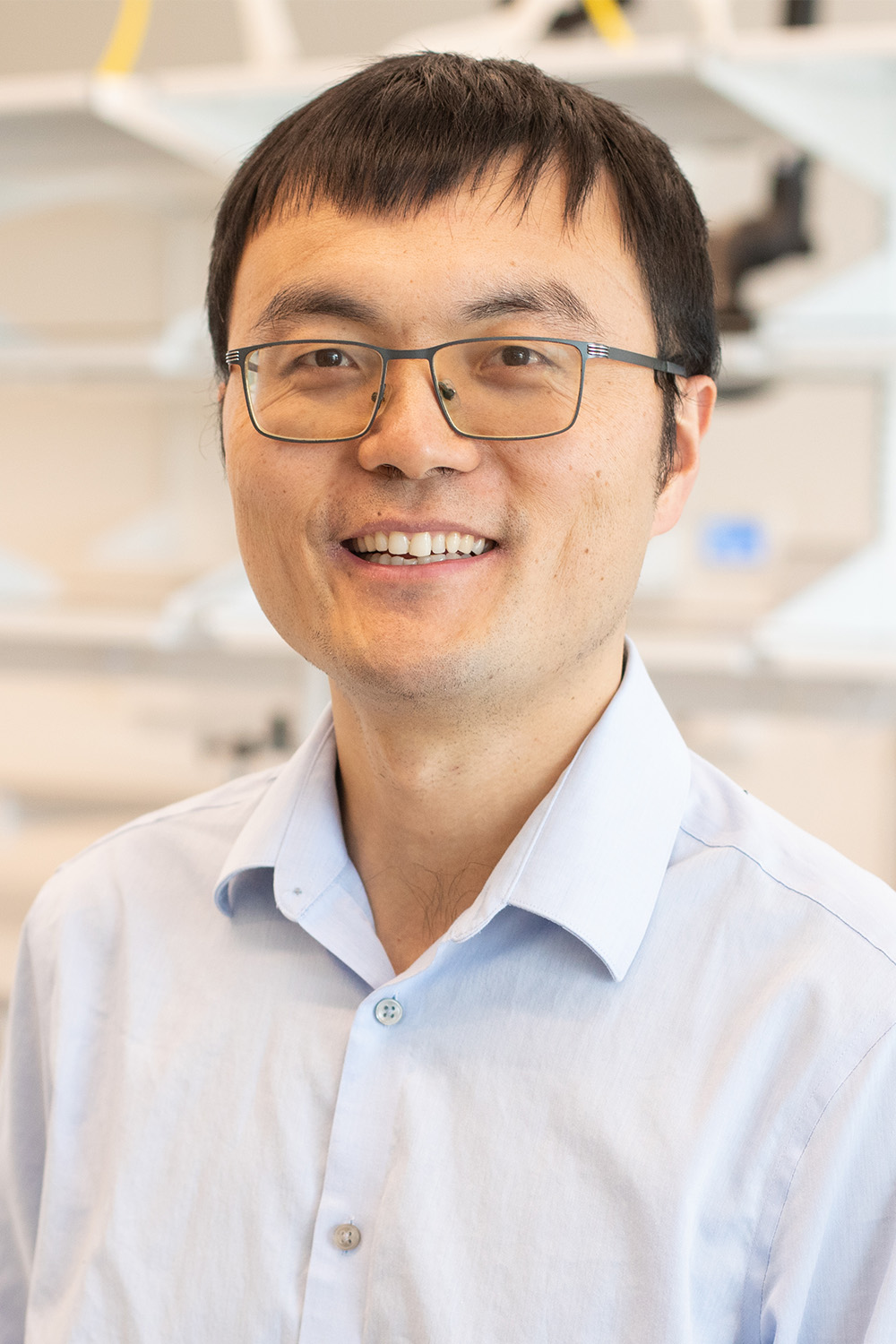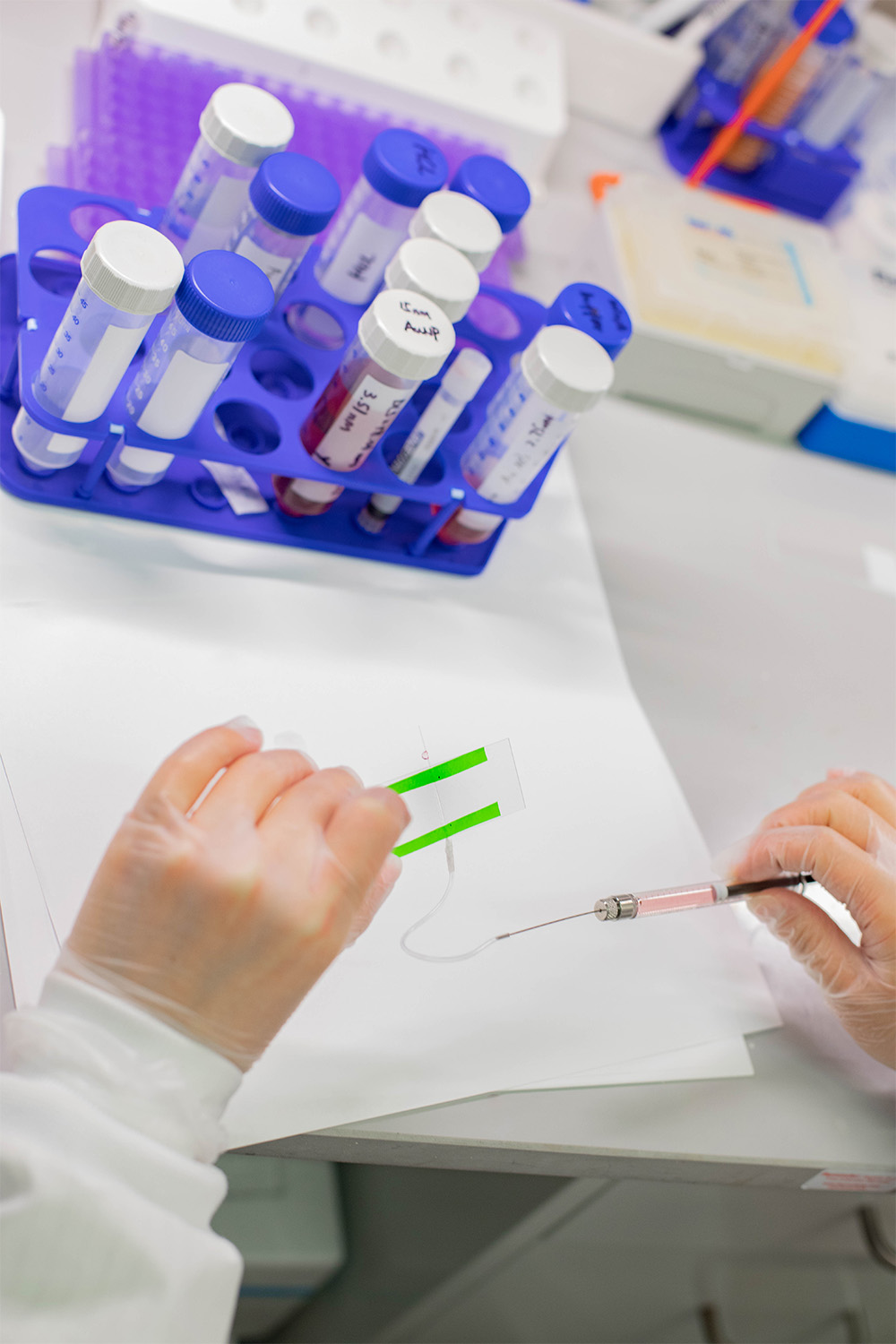The Cancer Prevention & Research Institute of Texas (CPRIT) has awarded grants totaling more than $2 million to two University of Texas at Dallas engineers for their research to develop technologies for early detection of oral cancers and to deliver medication past the blood-spinal cord barrier.
The Individual Investigator Awards to Erik Jonsson School of Engineering and Computer Science researchers are among $98.6 million in CPRIT grants announced Feb. 21 to advance the state’s fight against cancer.

Dr. Baowei Fei, professor of bioengineering, received a $1 million grant to develop a handheld imaging tool for early detection of oral and oropharyngeal cancers. Dr. Zhenpeng Qin, associate professor of mechanical engineering and bioengineering, also was awarded $1 million to advance his work to deliver medication to treat spinal cord tumors.
Portable Oral Cancer Scanner
Oral and oropharyngeal squamous cell carcinomas are often diagnosed after the cancer has advanced, leading to low survival rates. Dentists currently screen for oral cancers visually through oral examination under normal light.
Fei, the Cecil H. and Ida Green Chair in Systems Biology Science at UT Dallas, and his team have developed a small, portable device that uses hyperspectral imaging to analyze how cells reflect and absorb light across the electromagnetic spectrum, beyond what the human eye can see. The device uses artificial intelligence to identify suspicious masses that require follow-up diagnosis and possible treatment. Fei is collaborating with researchers at Texas A&M University School of Dentistry and UT Southwestern Medical Center, where he is a professor of radiology, to test the technology in a prospective clinical study.
“The handheld probe could be widely used as a low-cost, easy-to-use point-of-care device at dental offices, outpatient clinics and remote areas to detect tumors earlier, which would help reduce deaths from oral cancer,” Fei said.
Fei received a $1.6 million CPRIT grant in 2019 to advance hyperspectral imaging technology.
Delivering Treatment to Spinal Tumors

The blood-spinal cord barrier is a complex structure that protects spinal cord tissue by stopping most molecules, including medications, from entering.
“Treating spinal cord tumors is challenging because we don’t have a well-defined course of treatment,” said Qin, Fellow, Eugene McDermott Distinguished Professor. “The difficulty in getting medication past the blood-spinal cord barrier means there are limited options for therapy. Our light-based approach offers a unique approach for treating tumors in the spinal cord due to its minimal invasiveness.”
Qin and his team use light to stimulate tiny particles remotely that temporarily open the blood-spinal cord barrier so medication can pass through. He is working with colleagues at UT Southwestern to demonstrate the efficacy of the approach in mice. His research partners at UT Southwestern include Dr. Robert Bachoo, associate professor of neurology and internal medicine, and Dr. Elizabeth Maher, professor of internal medicine and neurology.
Qin previously received four CPRIT grants, in 2016, 2018, 2019 and 2021, totaling $1.6 million.
CPRIT has funded 1,967 awards totaling $3.5 billion for cancer research, product development and cancer prevention since 2010. UT Dallas has received $30.7 million from CPRIT to date to support cancer-related research.
Dr. Joseph Pancrazio, vice president for research and innovation and professor of bioengineering at UT Dallas, said CPRIT support accelerates the development of lifesaving technologies.
“CRPIT funding is critical to university research that will improve the prevention and treatment of cancer,” Pancrazio said. “These new grants will help UT Dallas engineers take their research to the next level.”
Qin Named Senior Member of Inventors Academy
Dr. Zhenpeng Qin, an associate professor of mechanical engineering and bioengineering at The University of Texas at Dallas, has been named a senior member of the National Academy of Inventors (NAI).
Qin is one of 124 emerging academic inventors in the 2024 class of senior members who will be recognized at the academy’s annual conference in June in Raleigh, North Carolina.

NAI senior members are faculty, scientists and administrators with success in patents, licensing and commercialization who have produced technologies that have brought or aspire to bring real impact to society.
Qin has led the development of an accurate, rapid infectious disease test and a technique to open the blood-brain barrier temporarily to deliver medication to the brain. He joined the Erik Jonsson School of Engineering and Computer Science in 2015 and directs the NanoBioengineering Laboratory, which is affiliated with UT Dallas’ Center for Advanced Pain Studies, of which Qin is a founding member.
In addition to his research activity, Qin and his partners launched Avsana Labs, for which he is president, to commercialize the rapid infectious disease test technology through UT Dallas’ Venture Development Center.
“The recognition of NAI senior member is a testament to the innovative work and entrepreneurial efforts of our trainees and partners at UT Dallas and the business community,” said Qin, who is a Fellow, Eugene McDermott Distinguished Professor. “I am grateful for the recognition and excited to turn our discovery into products to make an impact. I am inspired by my colleagues who have helped me along the way, and I appreciate the nomination by Dr. Ray Baughman.”
Qin works closely with collaborators at UT Southwestern Medical Center, where he is an adjunct faculty member in the Department of Biomedical Engineering. His research has been funded by the American Heart Association; Cancer Prevention & Research Institute of Texas; Congressionally Directed Medical Research Programs; National Institutes of Health; and the National Science Foundation, among others.
Qin has received numerous honors for his research, including being named a fellow of the American Society of Mechanical Engineers (ASME) and receiving ASME’s 2022 Y.C. Fung Early Career Award and the Dr. Horace Furumoto Innovations Professional Development Young Investigator Award from the American Society for Laser Medicine & Surgery.
Qin is the second UTD faculty member to become an NAI senior member. The first was Dr. Walter Voit BS’05, MS’06, associate professor of materials science and engineering and of mechanical engineering, who was named in 2023.
“We are delighted that the NAI is recognizing Dr. Qin as a senior member,” said Dr. John H.L. Hansen, associate dean for research in the Jonsson School, professor of electrical engineering, founder and director of the Center for Robust Speech Systems and Distinguished Chair in Telecommunications. “Dr. Qin has achieved remarkable success and impact in the development of innovative nanotechnologies and advancing them along the path to commercialization so they can improve health of individuals and save lives. The Jonsson School is very happy for his success.”

